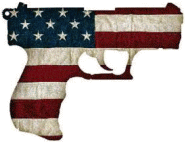Landmark case on D.C. ban expected to have major ramifications
WASHINGTON - In a landmark hearing on gun ownership, the Supreme Court appeared ready Tuesday to endorse the view that the Second Amendment gives individuals the right to own guns, but was less clear about whether to retain the District of Columbia’s ban on handguns.
The justices were aware of the historic nature of their undertaking, engaging in an extended 98-minute session of questions and answers that could yield the first definition of the meaning of the Second Amendment in its 216 years.
A key justice, Anthony Kennedy, left little doubt about his view when he said early in the proceedings that the Second Amendment gives “a general right to bear arms.”
Several justices were skeptical that the Constitution, if it gives individuals’ gun rights, could allow a complete ban on handguns when, as Chief Justice John Roberts pointed out, those weapons are most suited for protection at home.
“What is reasonable about a ban on possession” of handguns? Roberts asked at one point.
Justice Samuel Alito, who like Roberts was appointed by President Bush, cited another provision requiring rifles or shotguns be kept unloaded and dissembled or bound by a trigger lock, and said it did not seem as if they could be used as such for the self-defense of one’s home.
The court’s four liberals seemed most sympathetic to the law during the arguments. Justice Stephen Breyer suggested that the District’s public safety concerns could be relevant in evaluating its 32-year-old ban on handguns, perhaps the strictest gun control law in the nation.
“Does that make it unreasonable for a city with a very high crime rate ... to say ‘No handguns here?’” Breyer said.
Bush administration sides with partial bans
Solicitor General Paul Clement, the Bush administration’s top Supreme Court lawyer, supported the individual right, but urged the justices not to decide the other question. Instead, Clement said the court should allow for reasonable restrictions that allow banning certain types of weapons, including existing federal laws.
He did not take a position on the District law.
The court has not conclusively interpreted the Second Amendment since its ratification in 1791. The basic issue for the justices is whether the amendment protects an individual’s right to own guns or whether that right is somehow tied to service in a state militia.
The 27 words and three enigmatic commas of the Second Amendment have been analyzed again and again by legal scholars, but hardly at all by the Supreme Court.
The amendment reads: “A well regulated militia, being necessary to the security of a free state, the right of the people to keep and bear arms, shall not be infringed.”
The court's ruling, expected by the end of June, could have a far-reaching impact on gun-control laws in the United States and could become an issue in the November election.




